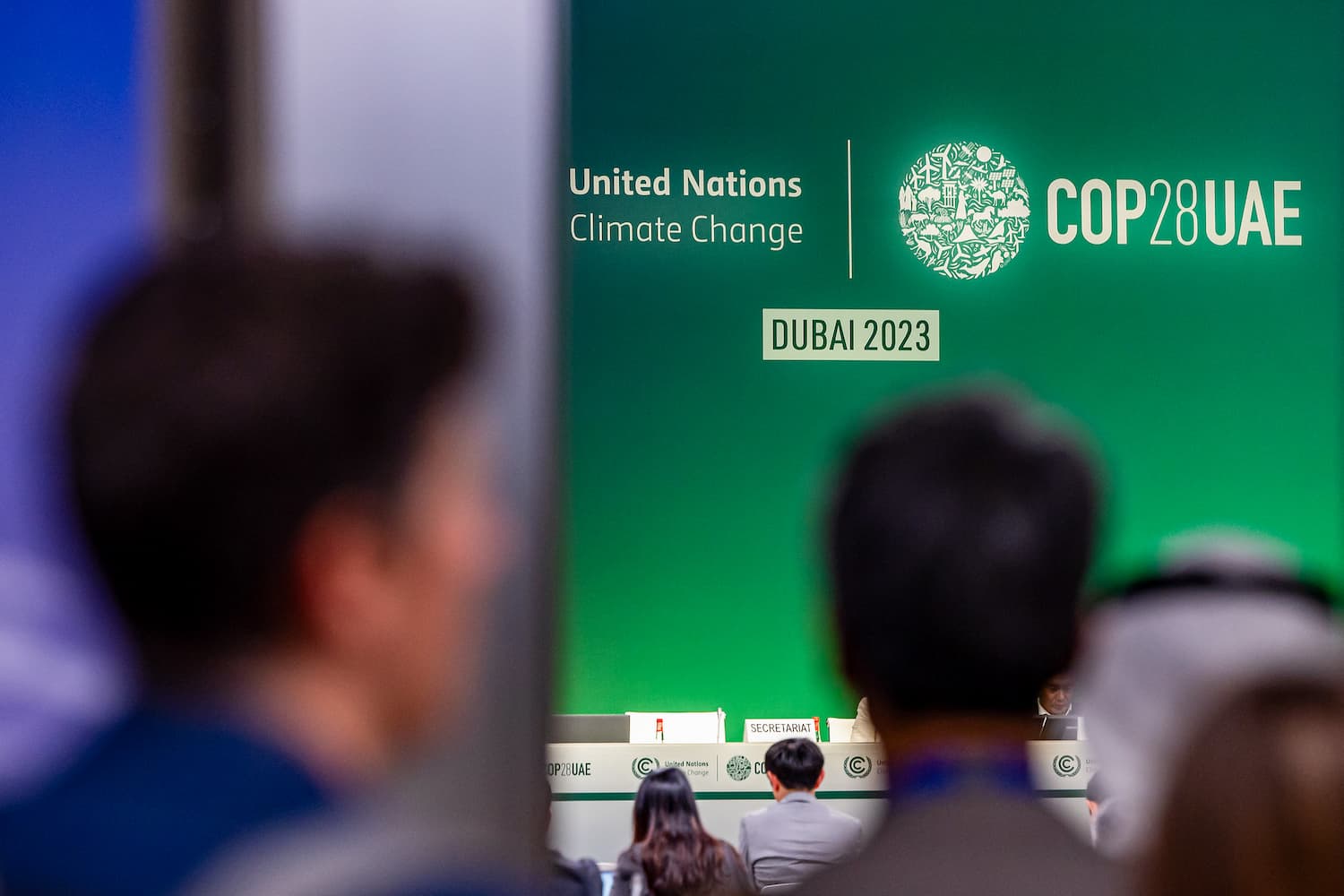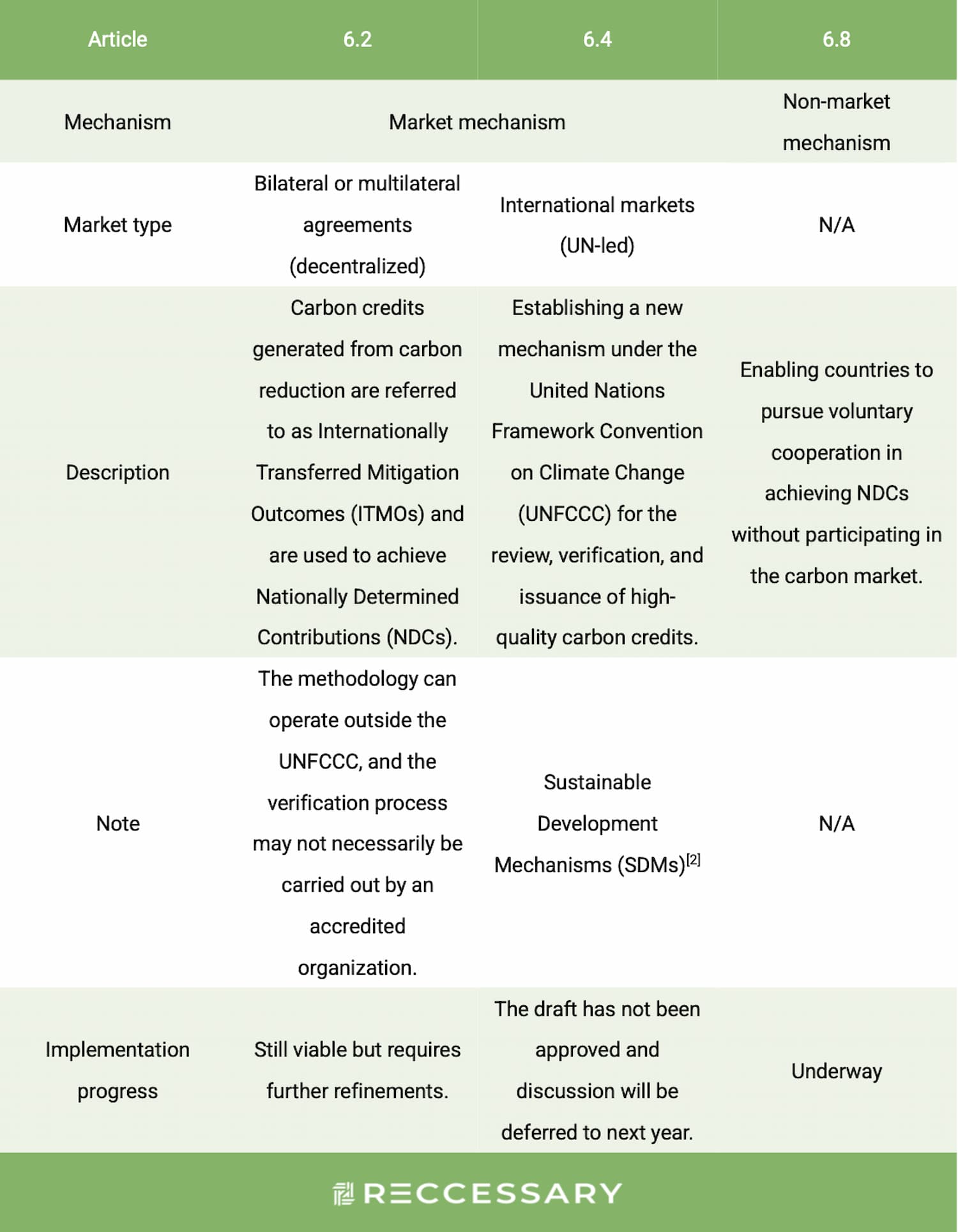
(Photo: UNclimatechange)
The 2023 United Nations Climate Change Conference (COP28) closed on December 12, with particular attention on the adoption of Article 6 of the Paris Agreement, which allows parties to offset their own emissions by financing other countries' reduction initiatives, thereby reducing carbon reduction costs and establishing carbon markets through carbon credit trading.
Despite several failed negotiations, the Paris Agreement is still eagerly anticipated as it seeks to reduce cost pressures and increase the efficiency of carbon reduction efforts, as well as to channel financial resources to the most effective regions and projects through various market mechanisms.
Article 6 mechanism: Implementation of Nationally Determined Contributions (NDCs) [1]
The most widely recognized provisions of Article 6 are 6.2, 6.4, and 6.8, considered as the three tools that countries can use to achieve their emission reduction targets. The comparison of the three articles is illustrated in Figure 1 below.

Figure 1. Comparison of Article 6.2, 6.4, and 6.8
Credibility, or the quality of carbon credits, has been a primary concern for the voluntary carbon market in recent years. Due to insufficient rigor of the three instruments mentioned above, the UN Climate Change Conference revises these articles annually, while the market anticipates more detailed guidelines. However, as the Paris Agreement is constructed on a national basis with intricate interests and responsibilities, reaching consensus in the policy development process can be time-consuming.
Impact of lack of consensus on Article 6
At COP28, countries took different positions. The US-led group believed in that a milder approach to regulation should be adopted or it would be difficult to implement, while the other group, comprising some countries in Europe, Africa, and Latin America, believed that checks and balances should be strengthened to prevent confidentiality agreements from hindering scrutiny. The outcome of the negotiations, on which there is no consensus, will have two major impacts on the global carbon market:
Weak framework turns carbon credits into a greenwashing tool
Article 6.2 grants the entitlement to full confidentiality and streamlines the review of national agreements into a checkbox exercise, enabling parties to disregard specific rules without facing penalties. One of the primary concerns in Article 6.4 is the lack of rigor in the methodology for carbon removal and the inadequacy of guidelines on environmental integrity, resulting in credibility issues.
Additionally, there are unresolved issues, such as the methodology of the Sustainable Development Mechanism (SDM). Presently, the voluntary carbon market has reported malpractice in forest carbon sinks, with many projects making false claims about their carbon sequestration capabilities, either with technology yet to be implemented or with exaggerated sequestration capacities. As a fundamental role in the establishment of carbon credits, a lack of progress in methodology development can lead to a weak regulatory framework, potentially turning the market into a platform for dumping unwanted carbon credits.
Stalled international carbon market cooperation
Countries that have entered into bilateral agreements on carbon credits will also be impacted by the failure to reach a consensus at COP28. The lack of clear policy direction could undermine market transparency, potentially making negotiations more challenging in the upcoming year. For countries such as Switzerland, Japan, and Singapore, which are purchasing carbon credits under Article 6 to meet their climate targets, speculation about regulations for the next year may be necessary to avoid disruptions to their deals.
The prevailing uncertainty has inclined many to adopt a wait-and-see attitude, thereby impeding the growth of the carbon market in 2024. In addition, the climate benefits of the first carbon trading between Switzerland and Thailand have been called into question. To avoid reputational damage and reduce the risk of future liability, it is highly likely that new cooperation will be put on hold at this stage in favor of improving the rigor of existing standards and transparency of information.
Future of Paris Agreement and global carbon market
Despite the failure of Article 6 of the Paris Agreement, the newly established Global Carbon Registry platform opens the door for collaboration, allowing countries to achieve their Nationally Determined Contributions (NDC) without dependence on the carbon market.
The development of the global carbon market will not come to a standstill due to this non-passage. In fact, beyond intergovernmental cooperation and political maneuvering, demand for voluntary carbon credits remains robust among private enterprises. For instance, Delta Air Lines purchased over 26 million tonnes of carbon credits in 2021.
From a corporate perspective, carbon credits are essential to meet supply chain requirements or achieve their own carbon neutrality targets. Therefore, the global carbon market is expected to continue growing in the long run. To ensure stable market development, the Paris Agreement and other international agreements should expedite their refinement to adapt to rapidly changing market dynamics and avoid issues such as double counting and greenwashing. It is anticipated that the Paris Agreement, especially the unapproved Article 6.4, will attract even more attention at COP29 next year.
[1]Parties make GHG reduction commitment to the international community and submit an updated national climate action plan every five years to reinforce their determination to reduce emissions.
[2]As part of the Kyoto Protocol's Clean Development Mechanism (CDM), SDMs are designed to incentivize emissions reduction projects in developing countries.